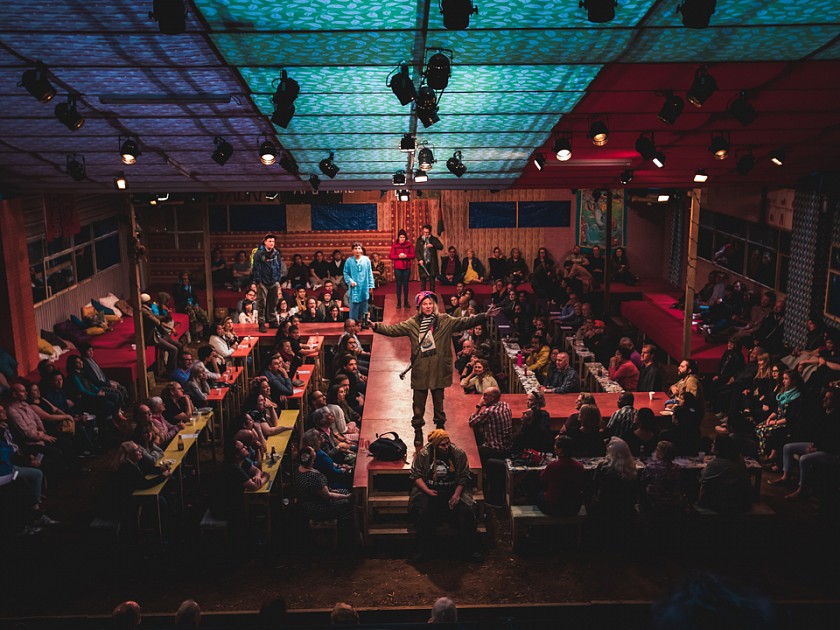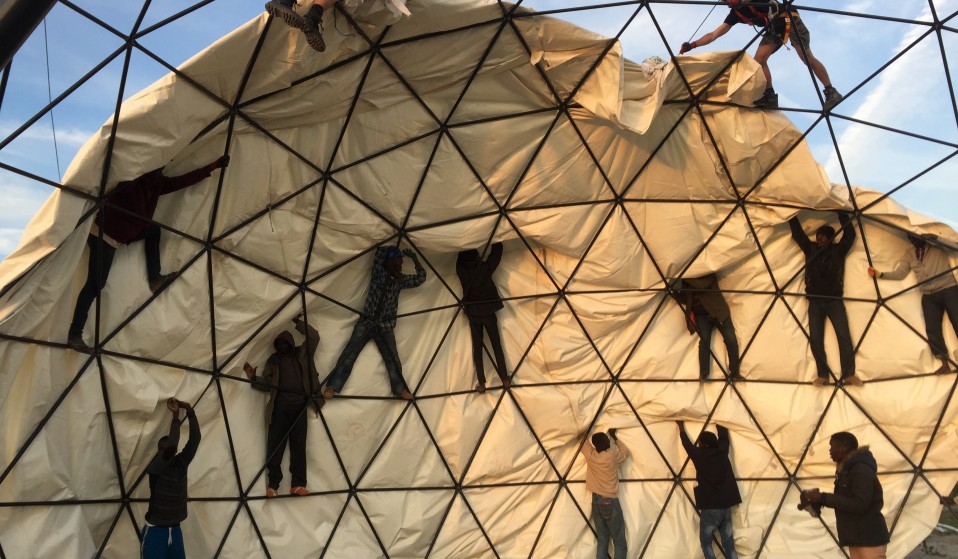Good Chance Theatre was started by two Brits, Joe Murphy and Joe Robertson, when, in 2015, they passed through Calais, France, on their way to Germany and they saw the makeshift refugee camp that had formed there. Many theatremakers might feel the need to share the refugees’ story with the world, but first Murphy and Robertson wanted folks in the camp to have “a platform to express themselves,” explained Dina Mousawi, Good Chance’s creative producer. So they decided to construct a theatre there in the shape of a geodesic dome, which has since become Good Chance’s signature pop-up venue; they spent seven months there in total. Vincent Mangado, a Théâtre du Soleil company member who joined their effort, described that first dome as a place “where everything could be spoken, a place of peace, a nerve center of the jungle, where you can share stories or throw a party, not just a theatre.”
Upon returning to the U.K., Murphy and Robertson were commissioned to write a play about their experience in Calais, which grew up into the international hit The Jungle (now at the Curran Theatre in San Francisco through May 19). They traveled around the U.K., leading workshops with migrants and asylum seekers to continue gathering material. And cast members: The Jungle’s ensemble comprises of actors of 11 different nationalities, including some people Murphy and Robertson met in Calais who had since emigrated to Britain.
The action of The Jungle is set in an Afghan restaurant that was built in Calais, and is staged with such an immersive aesthetic that audience members feel as though they are fellow diners at the restaurant. Along with the café, makeshift mosques, churches, shops, and other restaurants were constructed in Calais, despite extremely limited resources (just two water spigots and two porta-potties).
Mousawi joined Good Chance in September 2018, though she had been doing similar work for years both on her own and with Complicité. In fact, she led the first Good Chance workshop in the dome in Calais with 35 Sudanese men in Arabic. Raised in Iraq, Mousawi left during the war to move to England, but returned to the Middle East during the height of the conflict in Syria, feeling called to help by making theatre. There she worked with Syrian women to produce work telling their stories, which only strengthened her conviction that theatre is for everybody, and should be radically inclusive. Said Mousawi, “Theatre can act as a tool for so many things, and one of the ways we use it is to encourage integration in areas where there might be tension.”
While The Jungle was in development in the U.K., Good Chance took their dome to the Parisian banlieues—suburbs primarily inhabited by people of color and recent immigrants. In searching for a place to install themselves in Paris, they turned to Ariane Mnouchkine for advice, who connected them with Anne Hidalgo, Paris’s mayor. They spent six months in their first temporary home, in the 18th arrondissement (neighborhood), in an old train station, where Vincent Mangado helped construct the dome, along with several other members of the Théâtre du Soleil company. Mangado continued to follow the project as it migrated around Paris, including serving as its Parisian curator for March 2018 while it was located at Porte de la Chapelle, to the north of Paris.

While visiting the Porte de la Chapelle dome in Paris in March 2018, I met a young man named Abdul Saboor, who left Afghanistan in 2015 and arrived in Paris via Calais in October 2017 after a long, treacherous, and near-deadly journey. Saboor is a talented photographer, and is currently working as a cook in a restaurant, interning at a photography studio, and studying French in a certificate program. He began frequenting the Good Chance dome soon after his arrival in Paris, in January 2018, where he met other refugees, French people, and volunteers. He told me that prior to the installation of Good Chance’s dome, when he would cross paths with other young immigrant men in the park, they would talk about sad things. After Good Chance came, they would discuss things that made them happy.
Saboor began photo-documenting the world of the Good Chance dome, which led to an exhibition of his work in New York when The Jungle came to St. Ann’s Warehouse in Brooklyn. He said that when people would ask him why he stayed on the sidelines taking pictures while others danced in the dome, he answered that he “enjoyed looking at them when they are so happy.” The pictures he took of the young men involved with Good Chance have been sent back to their families to show they were not in the streets. Said Saboor, “It made me really happy, that their families will be happy to see them happy. I know they still have a lot of problems, but they show more happiness to their family.”
Good Chance’s dome in Paris moved four times, each time being lovingly deconstructed and resurrected by volunteers, before finally shutting its doors outside of the Musée national de l’histoire de l’immigration (National Museum of Immigration) at Paris’ Porte Dorée (to the east of the city) in November 2018. As a result of the dome residencies in Paris, recent immigrants have made lasting friendships with local Parisians and formed a weekly drama club, La Troupe, which continues to meet. What’s more, 10 scholarships were awarded to the International Fashion Academy in Paris as a result of one of the workshops in the dome, providing another pathway toward integration for some of the workshop participants.
Meanwhile Saboor is on the road to French citizenship, and just this month received an extended stay visa. “I try with myself to be okay, to be happy,” he said. “Sometimes it’s difficult. It takes time. It’s not easy to be happy. [Good Chance] was good to me, because I’m still in contact with them.”
After successful runs at the Young Vic and the Playhouse Theatre in the West End in London, The Jungle came to Brooklyn in December 2018, and is now at the Curran in San Francisco. Good Chance hopes The Jungle will continue to tour through the U.S. Mousawi said she hopes The Jungle will “raise awareness on the plight of migration as it pertains to people traveling: Everyone is a human being, and everyone deserves a good chance.” She also hopes American audiences will see the parallel between European migration and the current crisis on the U.S./Mexican border.
Good Chance Theatre has many projects in the works, gathering inspiration in and out of domes all over the world. They are exploring potential sites for the dome to go up in Paris and London later this year. They are currently producing a project that explores masculinity and vulnerability with British Muslim men, for which they have been conducting interviews and doing workshops with British locals. They are also planning a big project for 2020, spanning Europe and linking artists throughout the continent, with more information to follow on their website.
To those audiences moved by The Jungle, Mousawi recommends reaching out to migrants recently arrived in your local community to see what you can do to make them feel welcome. “That’s what Good Chance is all about,” she said. “Making people feel welcome, not alienated.”


